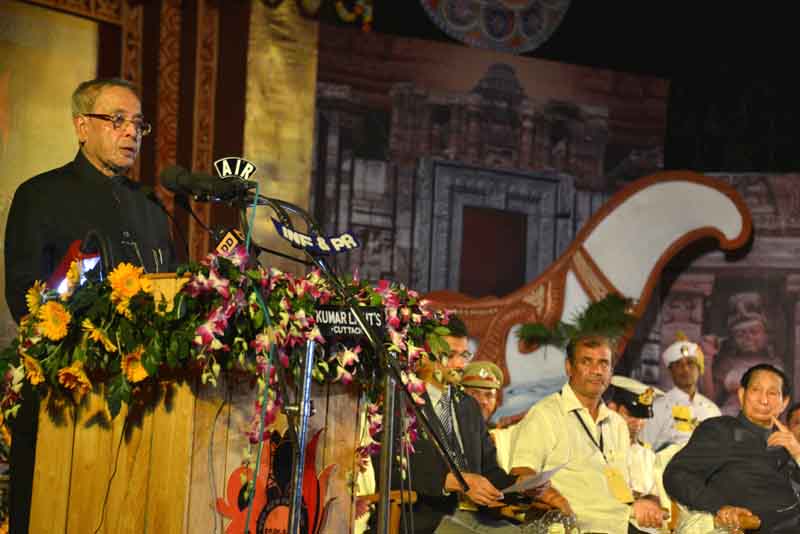Speech by the President of India, Shri Pranab Mukherjee on the Occasion of the Golden Jubilee Celebrations of the Utkal Sangeet Mahavidyalaya
Bhubaneshwar,Odisha : 29-11-2014
Download : Speeches ![]() (28.84 KB)
(28.84 KB)
 I am delighted to be amongst you today at the inauguration of the Golden Jubilee function of the Utkal Sangeet Mahavidyalaya. The Mahavidyalaya was set up in 1964 by the then Chief Minister of Odisha, the late Biju Patnaik, an ardent lover of Odishan art and culture.
I am delighted to be amongst you today at the inauguration of the Golden Jubilee function of the Utkal Sangeet Mahavidyalaya. The Mahavidyalaya was set up in 1964 by the then Chief Minister of Odisha, the late Biju Patnaik, an ardent lover of Odishan art and culture.
2. I am happy to learn that the Mahavidyalaya is imparting education in the field of music, dance and drama from the plus two level to the post-graduate level in thirteen different streams such as Odishi vocal, Hindustani vocal, Odishi dance, Odishi pakhawaj, Hindustani violin, the flute and the sitar. The Mahavidyalaya is now affiliated to the Council of Higher Education at the plus two level and to the Utkal University of Culture at the graduate and post-graduate levels and is awarding degrees like any other Indian University.
3. I am particularly happy to note that over the years this great institution has been living up to its vision of popularisation and dissemination of Odishan art and culture. The Gurus appointed since inception such as late Singhari Shyam Sunda Kar, late Shri Pankaj Charan Das, late Smt. Sanjukta Panigrahi, Dr. Bidut Kumari Choudhury and Shri Umesh Chandra Kar have been legends who have not only excelled in Odishan art and culture but have also been instrumental in propagating it throughout the world. Not surprisingly, the disciples who have emerged from the Mahavidyalaya such as Dhirendranath Mallick, Bhabani Charan Biswal, Subrat Pattnaik , Illian Citaristi and the late Gangadhar Pradhan have created a distinctive identity for themselves in the field of the performing arts. I am deeply appreciative of the efforts made by the Mahavidyalaya to keep alive Odishan art and culture.
Ladies and Gentlemen,
4. As you are aware, India is one of the oldest and culturally rich civilisations in the world. It is, therefore, only natural that performing arts have been an integral part of Indian identity and culture. They display amazing depth, richness and diversity developed over several millennia. Traditionally, these arts found patronage and flourished under enlightened rulers who themselves, at times, were great exponents of music and dance. This system of royal patronage of the arts, however, broke down during the colonial period.
5. By the turn of the 20thcentury, classical music and dance in India witnessed a host of changes and re-inventions. The most important of these were that the masters of the performing arts were now seeking to find patronage for them beyond the traditional historical domain. This essentially meant spreading the performing arts to practitioners and audiences outside of the traditional families and communities that had been the repositories of these art forms in pre-colonial times. These new impulses resulted in India rediscovering its culture in a manner and scale not previously seen. The introduction of the gramophone, the radio and later on, cinema served to further popularise these classical music and dance forms across India.
6. State funding of the performing arts was instituted by the Government of India post-independence and three national Akademis were set up in the early 1950s for documenting and disseminating knowledge of these art forms as also for their training and performance. Setting up of institutions like the Bhatkhande Music Institute, Lucknow and the Utkal Sangeet Mahavidyalaya, Bhubaneshwar is a continuation of this tradition wherein the State funds and promotes various forms and aspects of Indian art, music, dance, drama and culture-inherent in this is the realization that our classical arts are our link with the past and, thus, both the foundation for our current thought and the platform for our future action.
7. It is a matter of great satisfaction that the Mahavidyalaya has over the years lived up to the expectations that it had set for itself. I am confident that this great institution and its students will continue to excel in the performing arts. I once again take this opportunity to congratulate all of you on the occasion of the golden jubilee celebrations of the Mahavidyalaya and wish you all the best in your future endeavours.
Thank you!!
Jai Hind.
